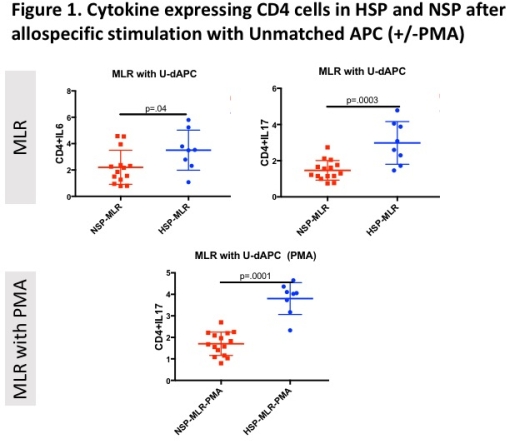Immune Profiling in Highly Sensitized Kidney Transplant Recipients
Surgery, McGill University, Montreal, Canada.
Meeting: 2018 American Transplant Congress
Abstract number: C7
Keywords: Allorecognition, Sensitization
Session Information
Session Name: Poster Session C: Antigen Presentation
Session Type: Poster Session
Date: Monday, June 4, 2018
Session Time: 6:00pm-7:00pm
 Presentation Time: 6:00pm-7:00pm
Presentation Time: 6:00pm-7:00pm
Location: Hall 4EF
Introduction: Highly sensitized patients (HSP) express foreign HLA antibodies and have poor graft survival due to higher incidences of graft rejection as compared to non-sensitized patients (NSP). Inflammatory cytokines secreted by T-helper (Th) cells induce B-cell proliferation and differentiation. We hypothesize that Th cells and their cytokines play key role in alloresponse in HSP and therefore sought to investigate their immune responses after non-specific or antigen-specific stimulation. Methods: PBMC were isolated from HSP(n=16) and NSP(n=13). PBMC were cultured overnight and stimulated with PMA/ionomycin/Brefeldein for 6 hrs. Intracellular cytokine (IFNg, IL4, IL6, IL17, TNF) expression in CD4 cells was analyzed by Flow Cytometry. One way multiple leukocyte reaction (MLR) was performed to measure antigen-specific stimulation. Recipient PBMC were primed with irradiated donor antigen-presenting cells (APC) carrying unacceptable HLA antigens (U-dAPC) or a matched donor APC (M-dAPC) for 6 days. In some cases, PMA was added for last 6 hours. Results: Non-specific stimulation with PMA significantly increased (IFNg, IL4, IL6, IL17, TNF) expressing CD4 cells in HSP indicating a higher degree of T-cell immune activity in HSP. Antigen-specific response was tested by MLR with U-dAPC which induced higher percentage of CD4+IL6 and CD4+IL17 cells in HSP implicating role of IL6 and IL17 in alloresponse. To examine memory response in HSP, MLR was performed with either matched or unmatched donor APC. U-dAPC significantly increased CD4+IL4 and CD4+IL6 cells but, CD4+IL17 cells in MLR with PMA in HSP suggesting that IL4, IL6 and IL17 may be mediating antigen-specific response. Interestingly, MLR with a M-dAPC induced CD4+IL17 cells in HSP than NSP suggesting an active IL17 pathway. Conclusions: Results suggest that HSP may have potent global immune response as compared to NSP. Alloimmune memory response is mediated by IL4, IL6 and IL17 in HSP. HSP may also have a stronger IL17 response in general. Blocking IL6 and IL17 pathways could be an attractive approach to reduce the risk of post-transplantation rejection in HSP.
To examine memory response in HSP, MLR was performed with either matched or unmatched donor APC. U-dAPC significantly increased CD4+IL4 and CD4+IL6 cells but, CD4+IL17 cells in MLR with PMA in HSP suggesting that IL4, IL6 and IL17 may be mediating antigen-specific response. Interestingly, MLR with a M-dAPC induced CD4+IL17 cells in HSP than NSP suggesting an active IL17 pathway. Conclusions: Results suggest that HSP may have potent global immune response as compared to NSP. Alloimmune memory response is mediated by IL4, IL6 and IL17 in HSP. HSP may also have a stronger IL17 response in general. Blocking IL6 and IL17 pathways could be an attractive approach to reduce the risk of post-transplantation rejection in HSP.
CITATION INFORMATION: Negi S., Rutman A., Paraskevas S., Tchervenkov J. Immune Profiling in Highly Sensitized Kidney Transplant Recipients Am J Transplant. 2017;17 (suppl 3).
To cite this abstract in AMA style:
Negi S, Rutman A, Paraskevas S, Tchervenkov J. Immune Profiling in Highly Sensitized Kidney Transplant Recipients [abstract]. https://atcmeetingabstracts.com/abstract/immune-profiling-in-highly-sensitized-kidney-transplant-recipients/. Accessed February 18, 2026.« Back to 2018 American Transplant Congress
